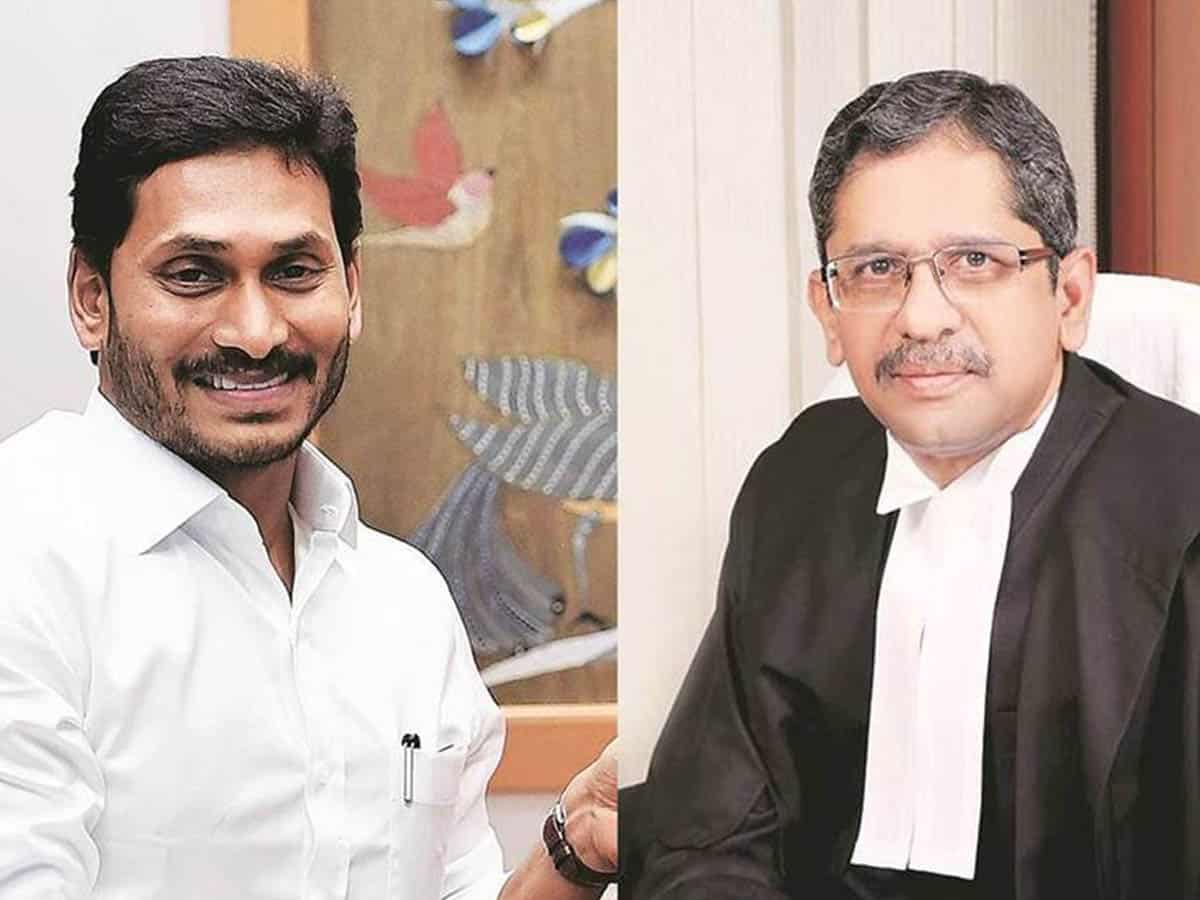Vijayawada: The initial lull has made way for heated polemics, and legal luminaries remained poles apart, giving out divergent opinions for and against Andhra Pradesh (AP) Chief Minister Y. S. Jaganmohan Reddy’s complaint to the Chief Justice of India (CJI) on the question of making the judiciary accountable and transparent.
Reddy’s whistle continues to blow around the collegium system of the Supreme Court (SC) since October 8, when his government made public his high-voltage complaint against judges of the Andhra Pradesh High Court. It has shocked the country, to say the least, given that such unprecedented allegations have been made against the the judiciary.
Among a bunch of dossiers annexed with his letter to Supreme Court CJI Sharad Arvind Bobde, Jagan quoted former Supreme Court judge Justice J. Chalameswar’s mentioning of “unwarranted intimacy” between previous (2014-19) Andhra Pradesh CM N. Chandrababu Naidu and CJI in-waiting Justice N. V. Ramana in appointment of judges for the AP/Telangana High Court in 2016 so as to lend legitimacy to his crusade.
Under the spotlight
The “use and abuse” of the Supreme Court collegium conspicuously remains at the centrestage in the whole discourse. Justice Ramana happens to be one of the five jurists in the collegium tasked with appointment of judges for the Supreme Court and the high courts in “consultation” with the executive.
The contention among the political class against the SC’s collegiums is deep-rooted and widespread as well, and it seeks legitimacy through Justice Chalameswar’s whistle blowing.
Justice Chalameswar’s critique of the Supreme Court’s collegium system has shaped the discourse on judicial accountability. In 2015, he expressed dissent in the ruling against the National Judicial Appointments Commission (NJAC).
Game of One-upmanship
The most tangible attempt at reforming judiciary made in the recent past was the NJAC. The NJAC was a body that was supposed to have comprised the CJI, two senior judges, the Union Law Minister, ‘two eminent personalities’ appointed by the Prime Minister and leader of the Opposition.
It was passed by Parliament in 2014 and even received the President’s assent. But it was struck down by the apex court. The NJAC aimed at curtailing judiciary’s “monopoly” and making it accountable to the executive elected by people as a reflection of democratic spirit in appointments and transfers of judges.
With the apex court striking it down, the Supreme Court collegium system is still supreme. Every organ of the constitution, be it judiciary or executive or legislature, is accountable to people in a democracy and no one is above the Constitution, contend the adversaries of the collegium system.
The Constitution alludes to the procedure of appointment of judges to the SC and HCs in Article 124 and Article 217 respectively. But the concept of collegiums does not find a mention in the Constitution.
These Articles state that judges of the Supreme Court shall be appointed by the President in “consultation” with the Chief Justice of India (CJI) and other judges of the Supreme Court and the High Courts as the President of India may deem necessary. However, the term “consultation” does not mean concurrence, the apex court ruled in a judgment.
Cause for concern
The judiciary’s integrity came under the spotlight when former CJI Ranjan Gogoi, charged with demanding sexual favours from an employee in his office, constituted a bench headed by himself to adjudicate the case in which he was accused. The victim was dismissed from service after she complained against the CJI.
The manner in which the Supreme Court handled a petition challenging the election of Pranab Mukherjee as the President in 2012 received criticism even from a section of in-service jurists. PA Sangma, a defeated candidate Presidential candidate, contended that Pranab’s election was not valid on the grounds of office of profit, under the article 58 of the Constitution. But the apex court declared the petition as not maintainable, without going into the merits of the petitioner’s contention.
“You are creating an organ which is now beyond democratic accountability, an organ that says it will appoint itself! In effect, it is a permanent priesthood. A democracy does not envisage that”, N. Jayaprakash Narayan, a public policy expert and founder of Lok Satta Party, in an interview, told a magazine sometime back on the collegiums system.

